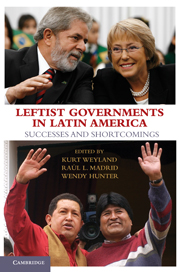Book contents
- Frontmatter
- Contents
- Acknowledgments
- Acronyms and Abbreviations
- Contributors
- 1 The Performance of Leftist Governments in Latin America: Conceptual and Theoretical Issues
- 2 The Repeating Revolution: Chávez's New Politics and Old Economics
- 3 The Challenge of Progressive Change under Evo Morales
- 4 The Chilean Left in Power: Achievements, Failures, and Omissions
- 5 From Cardoso to Lula: The Triumph of Pragmatism in Brazil
- 6 Lula's Administration at a Crossroads: The Difficult Combination of Stability and Development in Brazil
- 7 The Policies and Performance of the Contestatory and Moderate Left
- Bibliography
- Index
2 - The Repeating Revolution: Chávez's New Politics and Old Economics
Published online by Cambridge University Press: 05 June 2012
- Frontmatter
- Contents
- Acknowledgments
- Acronyms and Abbreviations
- Contributors
- 1 The Performance of Leftist Governments in Latin America: Conceptual and Theoretical Issues
- 2 The Repeating Revolution: Chávez's New Politics and Old Economics
- 3 The Challenge of Progressive Change under Evo Morales
- 4 The Chilean Left in Power: Achievements, Failures, and Omissions
- 5 From Cardoso to Lula: The Triumph of Pragmatism in Brazil
- 6 Lula's Administration at a Crossroads: The Difficult Combination of Stability and Development in Brazil
- 7 The Policies and Performance of the Contestatory and Moderate Left
- Bibliography
- Index
Summary
This chapter addresses two questions. First, how “revolutionary” is the Hugo Chávez revolution (1999–present) in Venezuela; that is, how much of a departure from the past does the Chávez administration represent? Second, how sustainable are Chávez's economic policies?
On the first question, I will argue that the Chávez administration does represent a clear break from the past at the level of politics, but less so at the level of economics. Politically, the Chávez regime changed Venezuela from a system in which incumbent and large opposition forces shared the spoils of office into a system of reduced political sharing with, and constrained space for, opposition forces. This is not so much because the opposition has retreated voluntarily (as in fact it did in 2005 by refusing to compete in midterm elections) but mostly because the executive branch has concentrated power, eroded the autonomy of checks and balances, reduced press freedoms, imposed costs on actors situated in the opposition, and – since 2008 – failed to recognize the authority of elected opposition officials. In the introductory chapter, Weyland discusses the democratic trade-off faced by the left between mobilizing new, disenfranchised political actors and preserving pluralism. Under Chávez, this trade-off has been rejected, with the government showing little interest since 2005 in guaranteeing pluralism. Of all the elected governments in Latin America since the 1980s, not just those on the left, the Chávez administration has undermined liberal institutions of democracy the most, to the point where it makes sense to speak of a transition to some form of autocracy.
- Type
- Chapter
- Information
- Leftist Governments in Latin AmericaSuccesses and Shortcomings, pp. 28 - 56Publisher: Cambridge University PressPrint publication year: 2010
- 11
- Cited by

